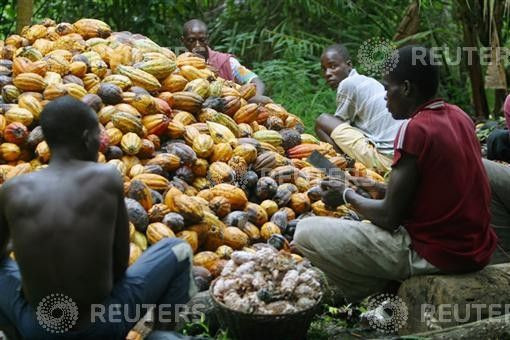Global Warming Makes Chocolate Dearer

Imagine a world without chocolate. Chocolate is definitely slated to become a luxurious commodity if steps are not taken to halt the impact of global warming. This has been emphasized in new findings by the International Centre for Tropical Agriculture (CIAT).
The CIAT study reveals that if preventive measures are not taken, the annual temperature increases and changing rainfall patterns would most likely hamper crop production efforts in West Africa, which currently supplies half of the world's cocoa produce. Fifty three per cent of the world's chocolate supplies come from Cote D'Ivoire and Ghana but increase in temperatures and changing precipitation in these regions could mean brisk decline in growing conditions over the coming decades.
The report says that between 2030 and 2050, land suitable for cocoa production would be reduced with the likelihood of cocoa production to be shifted to less suitable areas. This change is seen to largely impact the chocolate industry globally while also hurting local farmers who rely on cocoa crops for their livelihood.
The cocoa trees play an absolutely critical role in the region's rural life, said lead author Peter Läderach, CIAT. Hundreds of thousands of smallholder farmers use their cocoa trees like ATM machines, he said.They pick some pods and sell them to quickly raise cash for school fees or medical expenses.
As developing nations like China import more and more chocolate, global demand for chocolate has shot up. The findings note that shortage of cocoa could impact it's demand leading to a price hike, an event which is most likely to be felt around 2030.
What we are saying is that if we don't take any action, there won't be sufficient chocolate around in the future, said Läderach. Already we're seeing the effects of rising temperatures on cocoa crops currently produced in marginal areas, and with climate change these areas are certain to spread, noted Laderach.
The study proposes finding new heat and drought resistant crops that could thrive in West Africa, while helping to transition cocoa production to more suitable areas.
The study utilized 19 climate change models indicating that even a two-degrees Celcius increase in temperature by 2050 is enough to cause areas like Ghana and the Ivory Coast too hot for cocoa plantation. In the likelihood of a temperature rise, it would be difficult to sustain cocoa farming as water would also become scarce. This, in turn, is expected to endanger developmental stages of cocoa pods that contain the cocoa bean which is the primary source of chocolate.
Areas growing cacao trees in the Amazon basin have also fallen victim to fungal infections. Recent reports state that Mars Candy Company is joining the USDA to sequence cacao genome before fungal blight reaches West Africa.
The Cocoa Research Association had in the past raised concerns that small farmers earn just 80 cents a day through cacao farming. Also, there is no incentive to replant cocoa trees when they die off. The five-year crop cycle is a damper in the absence of incentives and recent years have seen cocoa farmers migrating to cities instead.
As the health benefits of chocolate finds new takers, the insatiable demand for chocolate consumption has not been rallied by an equivalent supply chain.
© Copyright IBTimes 2024. All rights reserved.





















